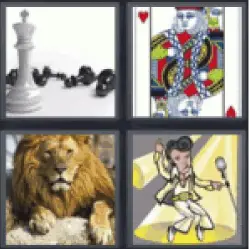Another Word For Poker Stake 4 Letters
Most people chose this as the best definition of ante: The definition of an ante. See the dictionary meaning, pronunciation, and sentence examples. 4 Pics 1 Word Cheat for puzzle of hand of four aces, people gambling playing cards, flush of spades, chips for gambling. 4 Letters 5 Letters 6 Letters 7 Letters. Blind definition, unable to see; having severely impaired or absolutely no sense of sight; sightless: a blind man. Poker Terms - Common Phrases and Acronyms. In poker, there is practically a library of poker terms that are commonly used. For the uninitiated, these terms can sound like a completely different language, when a poker player says, 'I flopped a belly buster on a rainbow board', when they are really saying that they have an inside straight draw, after the dealer dealt the first three cards, all.
definition - chinese poker
definition of Wikipedia
Advertizing ▼
Wikipedia
Chinese poker, also Pusoy (but not Pusoy Dos or Russian Poker), is a card game that has been played in the Asian community for many years. It has begun to gain popularity elsewhere because it has many features of an 'exciting' gambling game:
- The rules are simple—only a basic knowledge of poker hand rankings is needed to get started.
- There is a large element of luck involved, therefore a beginner has a good chance of winning in the short term, even against experienced opponents. Bad players may not be so easily deterred by losses, as they can more easily attribute bad results to their cards rather than their plays.
- More advanced players can still apply enough strategy to the game to give themselves a significant advantage over bad players.
- The game format results in frequent unexpected wins and high ranking hands.
- Only a few players are required to play the game.
|
Gameplay
Chinese poker is typically played as a four-person game, though it can also be played with two or three.

Another Word For Poker Stake 4 Letters Words
Playing a hand
In Chinese Poker, each player receives a 13 card hand from a standard 52 card deck. Each player then has to divide his cards into three poker hands (known as 'setting'): two containing five cards each (known as 'the middle' and 'the back'), and one containing three cards ('the front'); the back must be the highest ranking hand, and the front, the lowest ranking hand (note that straights and flushes do not count in the three card hand). The back hand is placed face down on the table in front of the player, then the middle hand is placed face down in front of the back hand, and the front hand is placed face down in front of the middle hand. After all the players have set their hands, each player will announce in turn (clockwise, starting from the left of the dealer) whether or not he is playing his hand. All players then announce their royalties, before revealing their hands.

If a player makes three flushes or three straights he automatically wins the hand, regardless of the other players' hands. As shown in the photo, the middle player has made all three hands flush and is an automatic winner.
Scoring
The stakes played for in Chinese poker are known as units: an amount of money agreed on before the game starts. Basic scoring rules dictate that a player collects one unit from each opponent whose front, middle or back hand is beaten by his own corresponding hand. Thus, unlike most poker games, being second-best at the table is good enough to win money. In some variants players are also paid an additional unit if they win in two or three of the hands. In other variants players only get an additional unit if they win all three hands (known as a scoop). Also, due to the head-to-head nature of the comparisons, it is possible for different players to play for different stakes. For example, A and B could play for $10 per unit versus each other, while all other player pairings play for $1 per unit. Many variations of scoring are in common use; refer to the external links for more information.
The two most common scoring systems used in Chinese poker are the 2-4 scoring method, and the 1-6 scoring method.
In the 2-4 method the player receives 1 unit for each of the three hands they win, and 1 unit called the overall unit is awarded to the player who wins two out of the three hands, or all of the three hands. In the event of a tie in one of the hands, no money is exchanged for this particular hand. If one player wins both of the other two hands, they collect 3 units (1 for each hand, and 1 overall). If they each win one hand, no units are exchanged (each win 1 unit, and there is no overall).
In the 1-6 method the player receives 1 unit for each of the three hands they win, and 3 bonus units (on top of the three for the hands) if they win all three hands.
Example
| Ivey | Hellmuth | Winner | |
| Front | 6♠6♣4♥ | A♥K♦Q♦ | Ivey |
| Middle | 10♦10♠9♣Q♠8♣ | 9♥9♦5♥5♦4♣ | Hellmuth |
| Back | 3♥3♦3♠2♥2♦ | K♠J♠9♠8♠7♠ | Ivey |
In the 2-4 method, Hellmuth would pay Ivey two units; Ivey receives two points for winning front and back, loses one for losing middle and receives one as the overall unit for winning two out of three hands. In the 1-6 method, Hellmuth would pay Ivey one unit; again Ivey receives two points for winning front and back and loses one for losing middle, but he does not receive any bonus units.
Royalties
Royalties, or bonuses as they are sometimes called, are extra units that may be awarded to players with particularly strong hands. In some variants all royalties are worth the same amount (e.g., 1 unit per royalty). In other variants each royalty is given a different payout (e.g., 1 unit for a four of a kind in the back, and 2 units for a straight flush in the back). Sometimes only the winner may be awarded a royalty (e.g., four sevens in the back beats four sixes in the back; therefore, only the player with sevens is awarded a royalty). In some games players are allowed to break up straight flushes or four of a kinds and still receive royalties (e.g., a player is dealt four sevens; he may use three of them for a three of a kind in the front, and one as part of a straight in the middle). Some rules say that players are only allowed to claim one royalty per hand.
Royalties must be declared prior to the revealing of the hands.
Some hands and combinations of hands that are commonly awarded royalties are listed:
- Full house or better in the middle
- Three of a kind in the front
Naturals are special types of royalties where if dealt to a player, the player is rewarded immediately (prior to anyone surrendering), and the player does not set their hand:
- Three straights
- Three flushes
- Six pairs (counting all three hands)
- 13 unique cards (i.e. 2, 3, 4, 5, 6, 7, 8, 9, 10, J, Q, K, A)
Surrendering
If a player chooses to surrender his hand, he will pay an amount greater than the amount paid when losing 2 out of 3 hands, but less than the amount paid when getting scooped (losing all three hands). When surrendered, a player is not required to pay any royalties to his opponents. In some variations surrendering is not an option.
Mis-set Hand
If a player mis-sets his hand (e.g., he puts three of a kind in the front, but only two pair in the middle) then he must pay each of his opponents still in the hand (players who have not surrendered) an amount equal to being scooped. In some variations players are still required to play their hands.
Where played
Chinese Poker was played at the 1995 World Series of Poker and the 1996 World Series of Poker. In 1995, the $1,500 event was won by John Tsagaris, and the $5,000 event by Steve Zolotow. In 1996 the $1,500 event was won by Gregory Grivas, and the $5,000 event by Jim Feldhouse. There have been no Chinese Poker events at the World Series of Poker since 1996.
Chinese Poker is often played as a side game in large poker tournaments. Typical stakes are $25, $50 and $100 per unit. Some high stakes poker players are known to play as high as $500 or $1,000 per unit. Some even go as high as $15,000.
The Venetian, Bellagio and Wynn casinos in Las Vegas, Nevada have been known to spread Chinese poker at their poker tables.
Variations
- Low in the middle — In this variation, the middle hand is played as a Deuce-to-seven low hand.
- Criss Cross — This variation is played heads up: each player is dealt two 13 card hands and plays each of their hands against each of their opponents' hands. Players' hands are to be treated as two independent hands; they cannot exchange cards between the two hands.
- In this variation, The Wheel (A, 2, 3, 4, 5) is the second highest straight. Therefore, it is ranked above a 9, 10, J, Q, K straight, but below a 10, J, Q, K, A straight.
- Another variation scores the game 1 point per hand, with the winner of the game being the first to 11 points. If a player wins all 3 hands and there are 4 players, the winning player gets a 4th point.
External links
This entry is from Wikipedia, the leading user-contributed encyclopedia. It may not have been reviewed by professional editors (see full disclaimer)
Clue: Doctrine
Doctrine is a crossword puzzle clue that we have spotted over 20 times. There are related clues (shown below).
Referring crossword puzzle answers
Another Word For Poker Stake 4 Letters Crossword
Likely related crossword puzzle clues
Another Word For Poker Stake 4 Letters Crossword Puzzle
Recent usage in crossword puzzles:
Another Word For Poker Stake 4 Letters Crossword Clue
- Penny Dell - Oct. 14, 2020
- Evening Standard Quick - July 29, 2020
- Penny Dell Sunday - July 19, 2020
- Penny Dell - July 16, 2020
- WSJ Daily - May 23, 2020
- Evening Standard Quick - May 6, 2020
- Evening Standard - April 28, 2020
- Penny Dell - April 7, 2020
- Evening Standard - March 4, 2020
- Penny Dell - Feb. 20, 2020
- Canadiana Crossword - Jan. 20, 2020
- Universal Crossword - Jan. 5, 2020
- Penny Dell - Dec. 14, 2019
- Evening Standard Quick - Dec. 5, 2019
- WSJ Daily - Nov. 19, 2019
- WSJ Daily - Nov. 14, 2019
- Penny Dell - Nov. 4, 2019
- Penny Dell - Oct. 9, 2019
- Canadiana Crossword - Sept. 9, 2019
- Evening Standard - July 4, 2019